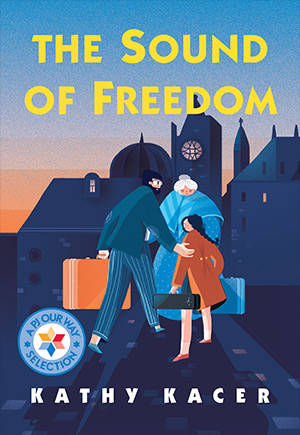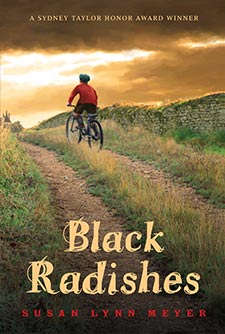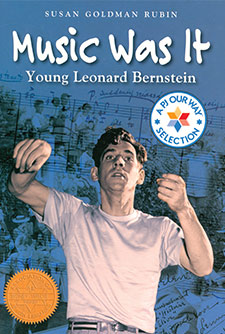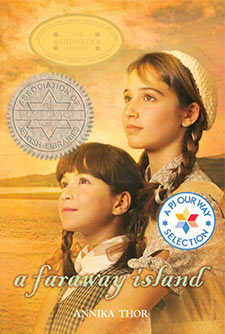The Sound of Freedom
It’s 1936 Poland, and Anna’s family needs to find a new home fast. Joining the new orchestra in the Land of Israel is the opportunity of a lifetime. Anna and Baba will do whatever it takes to get Papa to audition!
Average Rating
( hint: Login to leave a review! )
35 Reviews
Leave Review
What the Book is About
Jewish Content & Values
Positive Role Models
Content Advisory
Talk it Over!
More for You
What the Book is About
Life is good for Anna Hirsch: her loving father is a respected clarinetist in Krakow, her Baba is a wonderful cook, and Anna and her best friend Renata make a perfect team. But with Hitler in power, Mr. Hirsch’s music students abandon him, and Renata’s family leaves for Denmark. Then superstar violinist Bronislaw Huberman comes to Poland to audition musicians for a new orchestra he is setting up in Palestine. Anna’s father auditions successfully, and the family emigrates, embarking on a future full of new possibilities but also new challenges. The Sound of Freedom is based in part on the true story of the origins of the Israel Philharmonic.
Jewish Content & Values
- Over half of the book details life for Jews in Krakow during the first few years after Hitler came to power, including some detail of the growing persecution of Jews under the Nazis.
- There is vivid detail of Jewish immigrant life in Palestine in 1935, including haggling in the market in Tel Aviv, and the difficult conditions in which Huberman’s fledgling orchestra rehearsed, including playing while the concert hall was literally being built around them.
- Anna and her father go to the Jewish cemetery to put stones on her mother’s grave, in accordance with Jewish practice.
Positive Role Models
- When Hitler came to power, the world-famous violinist Bronislaw Huberman canceled all his concerts in Germany. He then decided to form a symphony orchestra in Palestine made up of European Jewish musicians in order to save them from persecution or death.
- Mr. Zaleski, the non-Jewish janitor at the music school, comes to the aid of Anna and her father when a group of drunken thugs breaks in looking for Jews. He quickly locks them in a closet and takes on the thugs in a fight. When the butcher, Mr. Kaplansky, is beaten up outside his store, Mr. Zaleski comforts him and walks him back to his home.
- When Anna’s father is reluctant to leave Krakow, Baba writes to Huberman to request an audition on behalf of her son because she knows that it is no longer safe in Krakow. When only two travel permits arrive, Baba selflessly insists that her son and granddaughter go to Palestine so that they, at least, can be safe.
Content Advisory
- There is some description of the harassment of Jews in Krakow: the butcher is beaten up while the policeman stands by and watches, and Anna and her father narrowly avoid being beaten up by a group of drunken thugs. There is also a reference to eliminating Jews in a speech by Hitler on the radio, but most of the time the author creates an atmosphere of menace without going into upsetting detail.
- The father of Anna’s friend, Eric, is also a musician and his family also emigrates to Palestine, but his family has trouble settling in and returns to Poland. The afterword explains that those members of the orchestra who returned to Europe perished in the death camps.
- Anna learns of an attack on Jews and a retaliatory attack on Arabs, both of which result in fatalities. There is a brief discussion about tensions between the Arab population and Jewish refugees, with the different groups each claiming the land, and a bomb goes off when Anna and Eric are at the beach, but the episode ends without anyone getting hurt.
- Anna’s mother dies before the start of the novel.
Talk it Over!
Sabina has been aggressive to Jews in the presence of her father, the Nazi-supporting local constable, as well as Jewish classmates. When she tells Mr. Hirsch that she will no longer be taking clarinet lessons from him, he is kind to her and tells her she is talented and should keep playing, despite knowing why she is stopping. Would you have responded in the same way as Mr. Hirsch? Why or why not?
More for You
Bronislaw Huberman was a child prodigy on the violin and was a touring concert artist from the age of 11. When he was 13, he was given a rare and very valuable Stradivarius violin by the Emperor of Austria. Huberman wanted to establish a classical music presence in Palestine and realized that he could do so and save some of Europe’s Jewish classical musicians. He said, "One has to build a fist against anti-Semitism—a first class orchestra will be this fist.” Huberman raised money to sponsor the members of the orchestra through fundraising dinners in the United States, hosted by well-known people including Albert Einstein. It is estimated that, including their families and descendants, Huberman’s efforts saved over 1,000 people. Huberman’s Stradivarius was stolen in 1946 and not found until 1986. It is now played by Joshua Bell, whose grandfather was born in Israel.
What the Book is About
What the Book is About
Life is good for Anna Hirsch: her loving father is a respected clarinetist in Krakow, her Baba is a wonderful cook, and Anna and her best friend Renata make a perfect team. But with Hitler in power, Mr. Hirsch’s music students abandon him, and Renata’s family leaves for Denmark. Then superstar violinist Bronislaw Huberman comes to Poland to audition musicians for a new orchestra he is setting up in Palestine. Anna’s father auditions successfully, and the family emigrates, embarking on a future full of new possibilities but also new challenges. The Sound of Freedom is based in part on the true story of the origins of the Israel Philharmonic.
Jewish Content & Values
Jewish Content & Values
- Over half of the book details life for Jews in Krakow during the first few years after Hitler came to power, including some detail of the growing persecution of Jews under the Nazis.
- There is vivid detail of Jewish immigrant life in Palestine in 1935, including haggling in the market in Tel Aviv, and the difficult conditions in which Huberman’s fledgling orchestra rehearsed, including playing while the concert hall was literally being built around them.
- Anna and her father go to the Jewish cemetery to put stones on her mother’s grave, in accordance with Jewish practice.
Positive Role Models
Positive Role Models
- When Hitler came to power, the world-famous violinist Bronislaw Huberman canceled all his concerts in Germany. He then decided to form a symphony orchestra in Palestine made up of European Jewish musicians in order to save them from persecution or death.
- Mr. Zaleski, the non-Jewish janitor at the music school, comes to the aid of Anna and her father when a group of drunken thugs breaks in looking for Jews. He quickly locks them in a closet and takes on the thugs in a fight. When the butcher, Mr. Kaplansky, is beaten up outside his store, Mr. Zaleski comforts him and walks him back to his home.
- When Anna’s father is reluctant to leave Krakow, Baba writes to Huberman to request an audition on behalf of her son because she knows that it is no longer safe in Krakow. When only two travel permits arrive, Baba selflessly insists that her son and granddaughter go to Palestine so that they, at least, can be safe.
Content Advisory
Content Advisory
- There is some description of the harassment of Jews in Krakow: the butcher is beaten up while the policeman stands by and watches, and Anna and her father narrowly avoid being beaten up by a group of drunken thugs. There is also a reference to eliminating Jews in a speech by Hitler on the radio, but most of the time the author creates an atmosphere of menace without going into upsetting detail.
- The father of Anna’s friend, Eric, is also a musician and his family also emigrates to Palestine, but his family has trouble settling in and returns to Poland. The afterword explains that those members of the orchestra who returned to Europe perished in the death camps.
- Anna learns of an attack on Jews and a retaliatory attack on Arabs, both of which result in fatalities. There is a brief discussion about tensions between the Arab population and Jewish refugees, with the different groups each claiming the land, and a bomb goes off when Anna and Eric are at the beach, but the episode ends without anyone getting hurt.
- Anna’s mother dies before the start of the novel.
Talk it Over!
Talk it Over!
Sabina has been aggressive to Jews in the presence of her father, the Nazi-supporting local constable, as well as Jewish classmates. When she tells Mr. Hirsch that she will no longer be taking clarinet lessons from him, he is kind to her and tells her she is talented and should keep playing, despite knowing why she is stopping. Would you have responded in the same way as Mr. Hirsch? Why or why not?
More for You
More for You
Bronislaw Huberman was a child prodigy on the violin and was a touring concert artist from the age of 11. When he was 13, he was given a rare and very valuable Stradivarius violin by the Emperor of Austria. Huberman wanted to establish a classical music presence in Palestine and realized that he could do so and save some of Europe’s Jewish classical musicians. He said, "One has to build a fist against anti-Semitism—a first class orchestra will be this fist.” Huberman raised money to sponsor the members of the orchestra through fundraising dinners in the United States, hosted by well-known people including Albert Einstein. It is estimated that, including their families and descendants, Huberman’s efforts saved over 1,000 people. Huberman’s Stradivarius was stolen in 1946 and not found until 1986. It is now played by Joshua Bell, whose grandfather was born in Israel.




